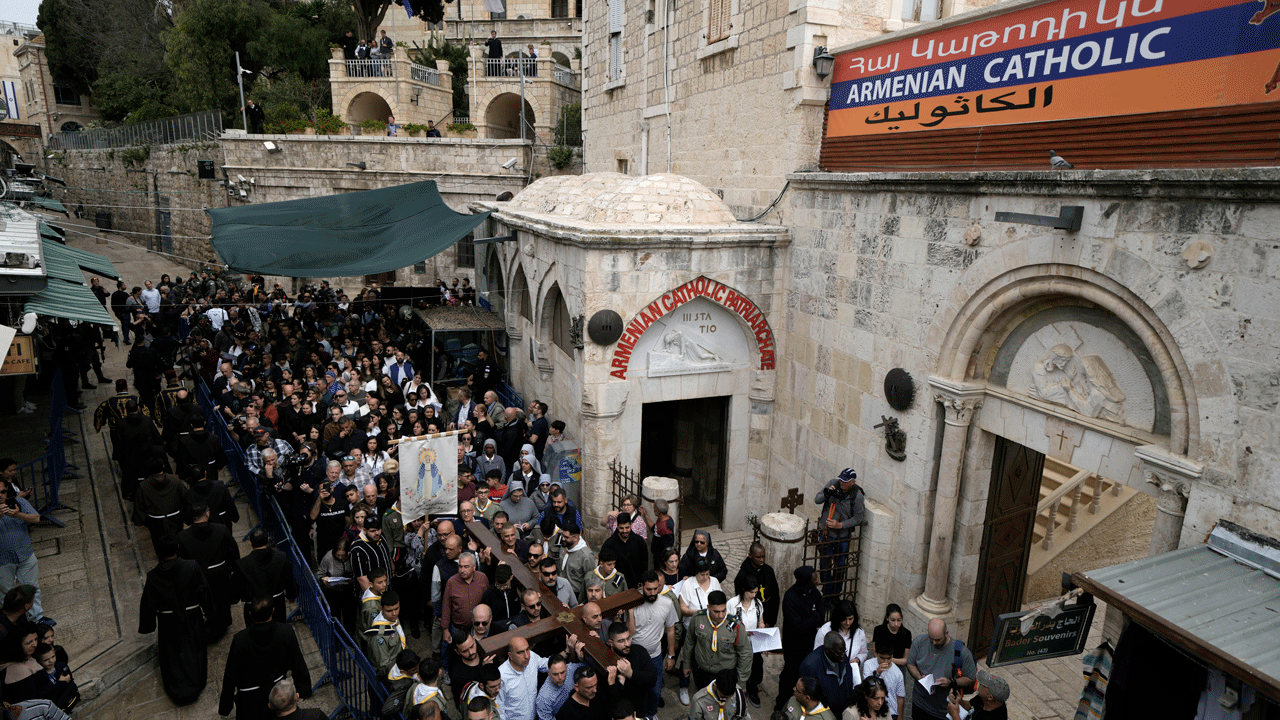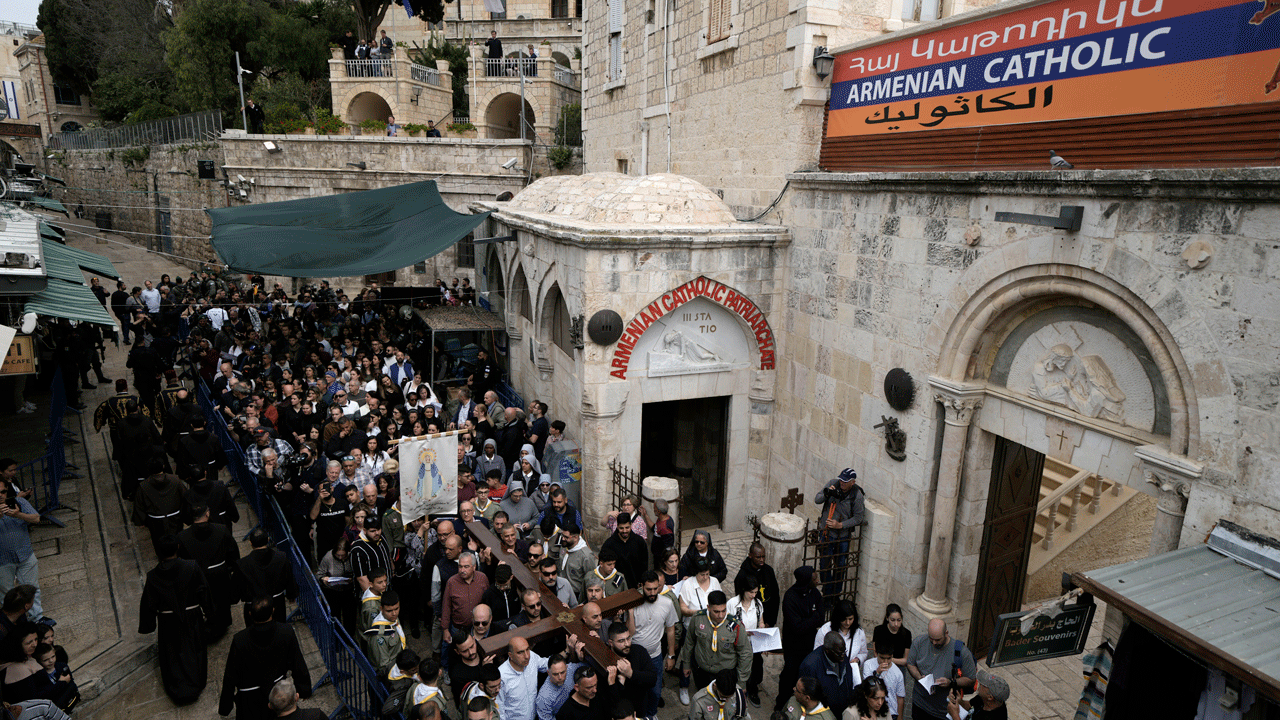INTERNACIONAL
In Jerusalem, Palestinian Christians observe scaled-down Good Friday rituals

JERUSALEM (AP) — Hundreds of Christians participated in a customary Good Friday procession through the limestone walls of Jerusalem’s Old City, commemorating one of the faith’s most sacred days with noticeably thinner crowds amid the ongoing Israel-Hamas war.
The day’s processions, which normally draw thousands of foreign visitors, were unusually local. Most observers were Palestinian Christians, joined by some foreigners living in Jerusalem and a few undeterred tourists.
WHY MIDEAST NEIGHBORS WON’T OFFER REFUGE TO PALESTINIANS STUCK IN GAZA WAR ZONE
The traditional Good Friday procession passes along the Way of the Cross, or Via Dolorosa, the route believed to have been walked by Jesus to his crucifixion. Squads of Israeli police set up barricades along the path, rerouting shoppers in the Old City’s bustling Muslim quarter to make way for hundreds of pilgrims.

Christians walk the Way of the Cross procession that commemorates Jesus Christs crucifixion on Good Friday, in the Old City of Jerusalem, Friday, March 29, 2024. (AP Photo/Leo Correa)
A young group of Palestinian Arab scouts led the day’s procession, past the 14 stations along the route, each marking an event that befell Jesus on his final journey. Hundreds of Palestinian Christians walked in their wake. Behind them was a small parade of the Franciscan religious order, composed mainly of foreigners who live in Jerusalem.
«We wait for this every year,» said Munira Kamar, a Palestinian Christian from the Old City, who watched the parade pass, waving hello to cross-bearers, who stopped to give her young daughter a kiss on the cheek. «Of course, this year we are unhappy because of the situation with the ongoing war.»
Thousands of Palestinians have been killed in Israel’s ongoing offensive in Gaza, launched after Hamas’ Oct. 7 killings and hostage-taking in Israel.
The procession’s final stations are inside the Church of the Holy Sepulcher, where Jesus is believed to have been crucified and laid to rest before his resurrection on Easter. There, the impact of the war was clear: instead of the crowds who normally queue for hours in the church courtyard, entrance to the site was easy.
The city’s streets were noticeably devoid of Palestinian Christians from the West Bank, who normally flock to the Holy City for the Easter festivities. Since Oct. 7, Palestinian worshippers have needed special permission to cross checkpoints into Jerusalem.
Despite the thinned crowds, shopkeepers, whose heavy metal doors are usually closed on Fridays, threw them open in for tourists seeking Catholic memorabilia. But interested shoppers were few and far between.
«Comparing last year’s Easter festivities with this year is like light and day. Nobody’s here. Most of the people are locals,» said Fayaz Dakkak, a Palestinian storeowner whose family first opened the shop in 1942. His shop stood empty. «Usually people are joyful today and kids are excited. But when you compare children here who have water and food and a family to what’s happening in Gaza, how can you be happy?»
An estimated 50,000 Christian Palestinians live in the West Bank and Jerusalem, according to the U.S. State Department’s international religious freedom report for 2022. Approximately 1,300 Christians lived in Gaza, it said. Some Christians are also citizens of Israel. Many Palestinian Christians live in diaspora communities.
A few tourists braved the day. Carmen Ros, a lawyer who lives in Jerusalem, had managed to corral a group of pilgrims from Spain to visit the country for a religious tour. The group rested in the shade outside the church.
«They were afraid of the situation at first,» she said, «but I told them here in Jerusalem, it’s safe, we don’t have violence. We are close to Gaza, but the Christian people are not the target of terrorism.»
The celebrations coincided with the third Friday in the Muslim holy month of Ramadan, with worshippers once again flocking to the revered Al-Aqsa mosque for prayer. Despite fears the ongoing war would spark clashes at the revered Al-Aqsa mosque, the month has so far passed peacefully under tight Israeli security.
CLICK HERE TO GET THE FOX NEWS APP
Sister Harriet Kabaije, a pilgrim from Uganda who moved to Jerusalem three weeks ago to live in a monastery, said she was holding the people of Gaza in her prayers. She said she believed that peace could be achieved in the region.
«Many people think that the war here is natural,» she said. «But when Jesus was in Bethlehem, it was peaceful. We know that people are suffering in Gaza so we carry them in our prayers and pray that peace can return to this land,» she said.
INTERNACIONAL
En una iniciativa sin precedentes, lanzan una alianza de países de América latina y el Caribe contra el crimen organizado

Los apoyos
-
POLITICA3 días ago
Robaron en una sede del sindicato de Camioneros: se llevaron la caja fuerte y millones en efectivo
-
ECONOMIA2 días ago
Javier Milei celebra su primer año con el optimismo por la economía en alza, según encuesta
-
POLITICA2 días ago
El Gobierno redujo la edad mínima para usar un arma en la Argentina: los nuevos requisitos
-
CHIMENTOS2 días ago
Jorge Rial reveló el oscuro motivo por el que echaron a Flor de la V de Intrusos: «La sacaron por ideología política»
-
POLITICA3 días ago
Los libertarios salieron al cruce de Kicillof por Aerolíneas: “Tiene la cara de amianto”
-
POLITICA1 día ago
Javier Milei anunció que se terminó la recesión y que en el año electoral bajará el 90% de los impuestos









































